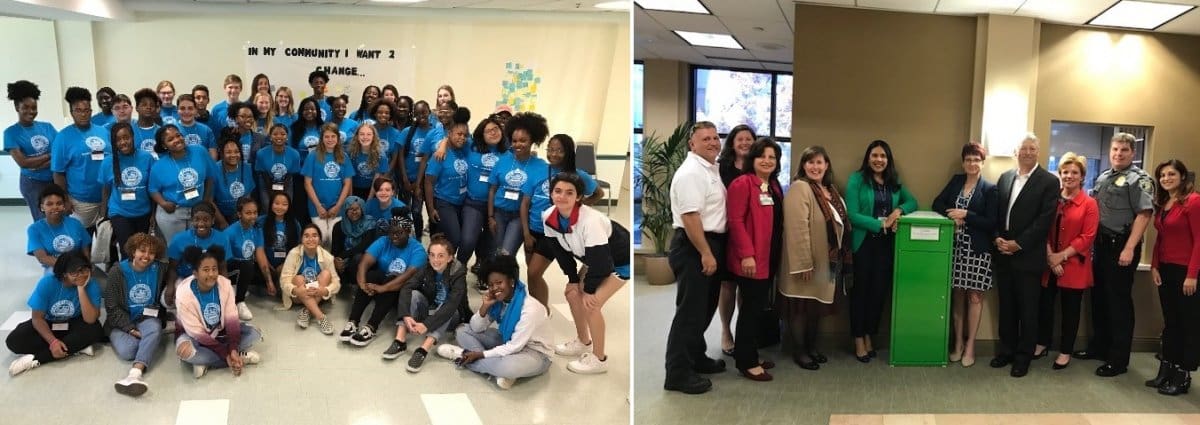
Tell me about your community and the communities that your coalition serves – its population and unique features. When was the coalition formed?
The city of Alexandria, Virginia is an urban area located on the banks of the Potomac River seven miles south of Washington D.C. It ranks as the third most densely populated city and the most densely populated county in Virginia. In 2018, its population was a little over 151,000 and the population has increased by almost 1 percent annually since 2000. While Alexandria has a reputation as being a wealthy, educated, professional community, and it is true that many people would match this profile, these themes over-simplify a more complicated reality in which Alexandria’s populations consists of a mix of very wealthy individuals and families living in poverty. For example, more than 60% of Alexandria City Public Schools (ACPS) students are eligible for free or reduced lunch.
The Substance Abuse Prevention Coalition of Alexandria (SAPCA) was formed in 2007 to address one of the four priority health issues identified by the city of Alexandria’s first Community Health Assessment. SAPCA is housed within the city of Alexandria’s Department of Community and Human Services Center for Children and Families. SAPCA’s mission is to engage diverse sectors of the community in collaborative, cross-cultural and comprehensive substance abuse prevention efforts that result in a reduction of underage substance use and abuse in the city of Alexandria. The coalition’s key priorities are preventing underage drinking, marijuana use, prescription drugs use and tobacco use. In December 2018, SAPCA celebrated its 10th anniversary with a community meeting and celebration.
What unique issues is your coalition facing?
One of Alexandria’s most unique factors, and greatest strength, is its diverse population. ACPS students hail from 114 different countries and 30% require English Language Learners services. As a result of their diverse community, the coalition has translated its materials into Spanish, Arabic and Amharic. We also work closely with the ACPS family and community engagement center, which helps provide outreach and translation services to families served by ACPS.
What activity or program is your coalition most proud of and/or what activity would you like us to spotlight?
“We recently unveiled our ‘Trend to Get Behind’ poster series,” said coalition coordinator Emma Beall. “These posters highlight the historical reductions Alexandria has seen in youth use of alcohol, marijuana, and tobacco, and encourage Alexandrians to get behind this trend. We have been sharing these posters through our newsletter and social media and distributed printed copies for partners to display at schools, recreation centers, libraries, the health department, city government buildings and local businesses.”
“We are also very proud to be the only community that holds four drug take back days a year. Over the past eight years, we have collected over 5,000 pounds of unused and expired medication through take back days and permanent drop boxes. We recently installed our second permanent medication drop box and plan to install a third permanent drop box in early 2019. Our first permanent drop box was installed at a local pharmacy in January 2018 and has already collected 400 pounds of medication. These take back days and drop boxes would not happen without the partnerships SAPCA has with the Alexandria police department and the Alexandria Sheriff’s Office, as well as a local independent pharmacy and Inova Alexandria hospital,” said Beall.
How did you get there, and what are your outcomes?
SAPCA works closely with the Alexandria Campaign on Adolescent Pregnancy (ACAP), a community coalition dedicated to preventing teen pregnancy. Together, SAPCA and ACAP approach risky-behaviors from an assets-based approach, drawing heavily from the Search Institute’s Developmental Assets Framework. For example, SAPCA and ACAP host quarterly “Titan Takeover” teen nights at recreation centers across the city; these events provide teens with a fun, substance-free place to hang out on a Friday night. SAPCA and ACAP also held their 5th annual Youth Leadership Conference last August. Over 50 high school students attended the free, three-day event that trains young leaders and connects them with opportunities to become more civically engaged in the Alexandria community. Workshops presented included “Finding Your Voice,” “Intro to Local Government,” and “Leaders in Action.” On the last day of the conference, community and non-profit leaders, elected officials, and representatives from several local boards and commissions attended a networking fair with conference participants to provide information about positions for youth in the city. SAPCA also works to reduce access to alcohol through the coalition’s great relationship with the Alexandria police department. The police department conducts periodic alcohol compliance checks with stores. Stores who pass these compliance checks are sent a letter of congratulations signed by the Chief of Police and the SAPCA Chair.
What advice would you give to other coalitions that may be addressing some of the same issues?
“It is essential to build and maintain relationships with elected officials at the local and state level, as well as partners across sectors,” said Beall. “These partnerships are not a one-way street. We try to provide support to our partners as often as we can.”
What are you looking forward to the most at National Leadership Forum/what do you hope to learn?
This year, SAPCA’s Coordinator Emma Beall will be attending the National Leadership Forum with 5 youth – 4 high schoolers and one middle school student. “I am excited to attend with so many youth and eager to see what ideas and skills they bring back from the Forum,” said Beall.
Feel free to add anything else that you think is important for other coalitions to know about your progress, journey etc.“
We would not be able to accomplish anything without our amazing volunteers, particularly our Chair Allen Lomax. Allen has served as SAPCA’s Chair for the past ten years and has dedicated over 3,000 volunteer hours to SAPCA,” said Beall.


